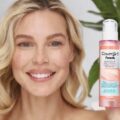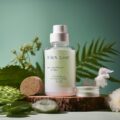The Skin Microbiome Revolution: Embracing Your Body’s Natural Ecosystem
For years, we’ve been taught that cleanliness is next to godliness when it comes to skincare. But what if everything we thought we knew about achieving healthy, glowing skin was wrong? Enter Mother Dirt, a groundbreaking skincare company that’s challenging conventional wisdom and encouraging us to embrace the good bacteria living on our skin.
Founded by MIT scientists, Mother Dirt is at the forefront of a skincare revolution that focuses on nurturing our skin’s microbiome – the diverse ecosystem of microorganisms that naturally inhabit our largest organ. Their approach? Less is more, and bacteria can be our skin’s best friend.
Understanding the Skin Microbiome: Your Body’s Invisible Ally
Our skin is home to trillions of microorganisms, including bacteria, fungi, and viruses. This complex ecosystem, known as the skin microbiome, plays a crucial role in maintaining skin health, protecting against harmful pathogens, and even influencing our immune system.
According to Mother Dirt’s founders, modern hygiene practices and harsh skincare products have disrupted this delicate balance, leading to a host of skin issues. By restoring and nurturing our skin’s good bacteria, we can potentially address problems like acne, eczema, and premature aging.
The Mother Dirt Approach: Cultivating Skin Health from the Outside In
Mother Dirt’s philosophy is simple yet revolutionary: instead of stripping away bacteria with harsh soaps and antiseptics, we should be cultivating the beneficial microbes that keep our skin healthy. Their products are designed to work with our skin’s natural biology, not against it.
The star of their lineup is the AO+ Mist, which contains live ammonia-oxidizing bacteria (AOB). These “peacekeeper” bacteria help balance the skin’s pH, reduce inflammation, and even minimize body odor naturally. It’s a prime example of how working with nature, rather than against it, can lead to healthier, more radiant skin.
Beyond Skincare: The Holistic Benefits of a Healthy Microbiome
The benefits of nurturing our skin’s microbiome extend far beyond just having great skin. Research suggests that a balanced skin microbiome can contribute to overall health and wellbeing in several ways:
- Strengthened immune system
- Reduced inflammation throughout the body
- Improved mood and mental health
- Better protection against environmental stressors
By embracing this more holistic approach to skincare, we’re not just improving our complexion – we’re supporting our body’s natural defenses and promoting overall wellness.
Rethinking Clean: Embracing a New Definition of Healthy Skin
The Mother Dirt approach challenges us to reconsider what “clean” really means when it comes to our skin. Instead of aiming for sterility, we should strive for balance and harmony with our skin’s natural ecosystem.
This doesn’t mean abandoning all hygiene practices, but rather being more mindful of how our choices affect our skin’s microbiome. Simple steps like reducing the frequency of soap use, avoiding harsh antibacterial products, and incorporating probiotic skincare can make a big difference in cultivating a healthy skin microbiome.
The Future of Skincare: A More Natural, Sustainable Approach
As we learn more about the importance of the skin microbiome, it’s clear that the future of skincare lies in working with nature, not against it. This approach not only promises better results for our skin but also aligns with a more sustainable, eco-friendly lifestyle.
By reducing our reliance on harsh chemicals and embracing products that support our skin’s natural biology, we can achieve healthier skin while minimizing our environmental impact. It’s a win-win for both personal wellbeing and planetary health.
Frequently Asked Questions About the Skin Microbiome
1. Is it safe to use products containing live bacteria on my skin?
Yes, when used as directed, probiotic skincare products like those from Mother Dirt are safe for most people. These products contain beneficial bacteria that are naturally found on healthy skin and have been extensively tested for safety.
2. How long does it take to see results when nurturing the skin microbiome?
Results can vary, but many people report improvements in their skin within a few weeks of adopting a microbiome-friendly skincare routine. However, it may take up to 3-4 weeks for your skin’s ecosystem to fully adjust and show significant changes.
3. Can I still use other skincare products while using Mother Dirt?
While you can continue using some of your regular skincare products, it’s best to avoid those containing harsh preservatives, sulfates, or antibacterial ingredients, as these can disrupt the balance of good bacteria. Mother Dirt offers a range of microbiome-friendly products that complement their probiotic mist.
4. Will cultivating good bacteria on my skin make me smell bad?
No, quite the opposite! Many users report that nurturing their skin’s microbiome actually helps reduce body odor naturally. The good bacteria help maintain a balanced pH and break down compounds that cause odor.
5. Is the skin microbiome approach suitable for all skin types?
Yes, supporting your skin’s microbiome can benefit all skin types. Whether you have oily, dry, sensitive, or combination skin, nurturing your skin’s natural ecosystem can help address a wide range of concerns and promote overall skin health.
Embracing the skin microbiome approach represents a paradigm shift in how we think about skincare and personal hygiene. By working with our body’s natural systems rather than against them, we open the door to healthier, more radiant skin and improved overall wellbeing. As the founders of Mother Dirt have shown, sometimes the path to great skin isn’t about adding more products or harsh treatments – it’s about cultivating the invisible allies that have been with us all along.









